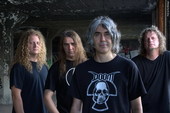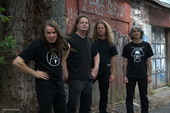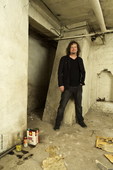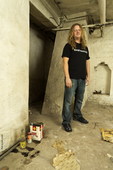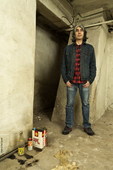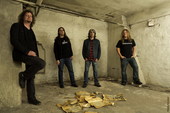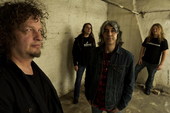Voivod
Don’t Wanna Be Stuck With Old Songs
31.01.2013
Архив интервью | Русская версияThe musical path of Voivod, one of the most outstanding bands on the North American metal scene, seemed to be coming to a logical end towards the turn of the last decade. Guitarist Denis D’Amour, aka Piggy, had suddenly died of cancer, and the rest of the line-up had no idea how to continue without him, therefore they focused on completing the music Piggy had written and recorded shortly before his death. However, miracles still happen on Earth – a fellow Quebec resident named Dan Mongrain turned out to be capable to taking over Denis’ role as both guitarist and songwriter, and Voivod entered the new decade as a fully capable band, which was confirmed by their latest record “Target Earth”, coming out in January 2013. Shortly before its release we hooked up with singer Denis “Snake” Belanger via phone, and he was pleased to tell us all the latest news directly from the band’s camp…
There was an announcement some years ago that "Infini" (2009) would be the last Voivod album and that the band planed to retire after releasing it. But now you’re going to release yet another one. Why did you decide to continue?
We spent a long time mourning Piggy, it was really a tough period, because when Piggy died, we couldn’t see how we can continue working without him. He has such a unique player with a unique style. The opportunity came to us when Blacky introduced us to Chewy (Dan Mongrain), and we got this gig at a festival in Montreal – Heavy MTL (it was held on June 22, 2008 – ed.). In the beginning we said that we were gonna try one show and see how people react to Voivod without Piggy. That was the big question in our minds. With Blacky back in the picture, it was kind of getting back in the past, and Chewy was representing possible future. After that show in 2008, the phone started ringing, and we got other opportunities to go to festivals around the world, and during 2008-2011 we were always touring. And after a couple of years of touring you cannot but start asking yourself, “OK, what’s next? Should we do something?” The process started slowly, Blacky and Chewy were putting riffs together, and it felt really natural for us to do it, because as an artist, you need to write stuff, you need to compose, you don’t wanna be stuck with all these old songs. Eventually we started the process of recording an album, it was a long process, but finally now it’s gonna be out next week. There’s a lot of excitement here in the Voivod camp, we’ve been doing interviews like crazy in the last couple of weeks, reviews are good, people can stream it from the net, and it seems like they’re really digging what we’re about to release. It’s a great feeling.
At the time of “Infini” there were some reports on the net suggesting that Andreas Kisser of Sepultura could be the next Voivod guitarist. Did you really consider him?
Yes, we were considering the help of Andreas. Andreas is a cool guy, he’s a Voivod fan, we were touring with him in the Jason period (2002-2008 – ed.). Andreas has a lot of Piggy in him, I think for him it would have been an honor to help us. All he said was like, “If you guys need help, I can do it, I can try to do it.” We were considering him, but the thing is that it would have been more difficult, since he is very busy with his thing, and also he lives in Brazil, which is quite far. (laughs) I’m not saying that it would have been impossible, but the circumstances are that Blacky showed up with this dude Chewy, we held an audition, and I was blown away! “Oh my God, if I close my eyes, it feels like Piggy’s in the room!” From that point, we kind of knew that Chewy was the best replacement for Piggy, so we went out with him.
How has the songwriting process in the band changed if you compare it to the way you did it with Piggy?
It’s quite the same. Of course, it’s different, because Chewy is not Piggy, but he really is open-minded, he can switch ideas really easy or make a move on something, he can decide, “OK, this is good, this is not good”. He kind of cleans his own pad before giving us any ideas. The process is different, of course, it’s a different situation, I think we know more now how to make great records. (laughs) We’re more confident and we’re more professional in a sense. It’s been working great with Chewy, he’s an open-minded person, so if we don’t agree with something, he’s very easy to deal with. What we have to think about is the result - no matter how big is our ego, the thing is what’s good for the song, that’s the real question. Chewy did an amazing job on the riffs and solos, and Blacky came back with his “blower bass” sound and his “blower bass” riffs – that was one of the signatures that Voivod had for so many years, and now on this record the blower bass is back. For the fans it’s a good sound.
The album was recorded back in January 2012, but it took you a year to get it out. Why did it take such a long time?
Yeah, we were recording in January 2012, but we took a break after the recording session, because after you lay down the tracks you need to get away from it and then come back to it. Then I have to say that the album was self-produced, and we had to shop around for labels. There was a lot of negotiations and stuff like that, and it basically took a whole year to find the right label and get them do their job.
How did you eventually find yourself on Century Media Records? It’s a very rare case when a band leaves Nuclear Blast and signs with Century Media, or vice versa, the labels very seldom trade off artists to each other…
Well, you know, the choice was made due to circumstances. What we did with Nuclear Blast was great, it’s a great record label, and they treated us really well. But times change, and the focus of everybody is moving into different directions. I don’t know if that’s really what happened, because I was not part of any negotiations with labels, but it feels like the most interested people get the record, and Century Media had a lot of interest in it. With Nuclear Blast we had an option, and we wanted to shop around and see who could do this job well and be fair with everybody in terms of how it goes. So far Century Media has been doing a great job, they are great people – and first of all, you have to deal with people in business. Once you’ve got great people in a company, it goes so much easier.
“Corps Etranger” off the new record is the first Voivod song with French lyrics, isn't it? Why did you decide to go for French lyrics in this particular song?
First of all, we’re from the French part of Canada, and this is our language… I don’t know, I always had my fear about singing in French. It’s a tough language, it’s really particular, and depending on how you sing and how you pronounce words, it may sound not real. I was always afraid of singing in French, but I had a lot of demands here in Quebec – “Why don’t you sing in French? It would be great!” It never felt natural to me, because I was always writing in English and all my background is the bands from England. For me it wasn’t natural to do it in French, but I said, “OK, this is going to be a new record with a new line-up, this is our 30th anniversary, so we gotta make something special, and I’ll give it a try.” But it wasn’t easy, I was really hard on myself, trying to do this with the right style and the right pronunciation. I think it came out good, as far as I’m concerned. People have told me, “Hey, this sounds great”, and I was more confident from that point. Maybe I was worried for nothing. (laughs)
In general, how do metal fans in Quebec like the bands who sing in their native language? In Russia it’s a kind of problem – some Russian fans like it when bands sing in Russian, others hate it…
Here you get a lot of respect when you do stuff in your own language. You can get a lot of help from the government to promote your stuff, because you sing in French. There’s a lot of artists that go for it, because it’s an easy way to get known right now. People are gonna focus on it, “Ah, this is great, this is our music from our cultural background”. You can ask for help – financial or whatever – to produce something. When you sing in English, it’s a long journey. (laughs) Nobody’s gonna help you, but you’re not gonna be limited, in a sense. Those who sing in French are limited by the territory, they’re only gonna tour in Quebec, and that would be it. For us it’s never been a question, we always sang in English because we wanted to tour the world, it was the main goal. But people like both, like you said, some people love it and some people hate it. Some people really can’t stand the French singing, and some are really into it, because it represents our cultural background somehow, and they attach some value to it.
Can you explain the song title "Kluskap O'Kom"? What does it mean, and what is the song basically about?
(laughs) “Kluskap O’Kom” is inspired by a native tribe in Canada, a tribe called the Mi’kmaqs. They’ve got an old legend, and in their mythology Kluskap O’Kom refers to the place where the Kluskap live. Kluskap is a sort of god, he can be described as a giant man than came on Earth long time ago. Sometimes he’s represented as a monster in a lake, sometimes as a giant man on a mountain… Anyway, the Kluskap are big men who came here to kill all the big animals like the dinosaurs in order for us, the humans, to take over the planet. It’s an old myth which I read inspired by Chewy’s friend, which is a girl from Mi’kmaqs. Her family is Mi’kmaqs, and she got into all the culture, mythology and history of the Mi’kmaqs. She found out about the Kluskap, and when I read it, I was like, “Oh my god, this is great for a song! The way this is described, I can picture that in a song.” And I decided to write about Kluskap O’Kom, the place where Kluskap live. It’s really related to where we live here, it’s about the woods, the mountains, the lakes, the rivers, the wilderness, and it fits totally with the music, too.
When you are recording your vocals in the studio, is there any particular sound or a vibe which you want to attach to it? Some reviewers refer to your vocals as “sarcastic”, “viperish” or “raven-like”. Do you intentionally try to make your voice sound this way?
Especially on this record, what I really focused on was delivering the track straight up, without any effects, just the clear track of whatever I had. Then I sang harmonies and fill-ups here and there. Basically the work on the sound of my voice is more at the mixing process, that’s where we add a lot of effects here and there, an echo, a delay, or a modulation - we kind of play with the sound. The mixer, Sanford (Parker), really helped us the way that he really put a side to the sound of music and the vocals, he was playing a lot with effects on the vocals. At first I freaked out a bit, I was like, “Oh, you’re putting too much stuff there!” (everybody laughs) I was thinking, “Is he fucking crazy or what?” And then I was like, “OK, this is good, we’re keeping it, this is a bit too much, we’re removing it.” He gave me great ideas how to adjust ourselves, and this adjustment was more at the mixing stage than at the recording stage, the recording was pretty much straight up.
Voivod were the curators of Holland’s Roadburn Festival last year. Can you say a few words about this experience? What were your duties as curators?
It was a great experience. We picked up the bands for the festival, but it was a long process, because you have to deal with schedules of every band, and we had a certain budget. Some bands we had flied in, some bands were close to the Netherlands… It was like a puzzle game, like, “OK, who can make it? Who can we afford?” It took a while and a lot of phone calls to make sure that we’ve got something strong enough to make a festival, to attract people’s attention which meant having great bands in the line-up so that people could buy tickets. It wasn’t easy, but Walter (Hoeijmakers), the chief promoter, is such a cool guy, he really helped us to manage everything and make sure that if, for instance, we have to fly a band, we’re gonna fly a band, it’s not gonna cost that much, and stuff like that. That year he had more power in his hands to make it happen, and it went pretty smoothly. But it’s a long process of phone calls and making sure that everybody can make it. As curators, we had to put it together in order to satisfy a large audience. It wasn’t just metal, it was more than that, different bands from different areas and different time, old bands, new bands, new discoveries, etc. It’s a really cool and open-minded festival, you can go there for metal or you can go there for obscure music, it’s all there, and it’s really cool.
How much do you listen to present-day music? Are you always on the hunt for some new sounds, or do you prefer your collection of classic records?
I’m more about classic records. (laughs) Sometimes I’ve been asked like, “What are you listening to?”, and I’m like, “I don’t know…” It’s a different thing when you create music, you’re focusing on what you’re doing, and it sometimes feels like I don’t need to listen to anything except what I have a chance to listen to. Sometimes I discover things, but in the end, when you do music, you’re thinking about what you have to do more than listening to records. Essentially I don’t listen to a lot of music – I’m making music! It’s like, “OK, I’ll put on a record to have fun while I’m having a beer with friends”, but I’m not always in the process of trying something new and discovering stuff. Sometimes it happens just like that – you play a show, there is an opening band, you don’t know them, you go see them, and you say, “Wow, that’s cool!” But the next day I won’t remember their name. (laughs) Maybe we have been doing it for too long… (laughs) I keep on listening to all my old classics of Motorhead, Ramones and stuff like that. I put a lot of hours into doing music, and sometimes I don’t feel like listening to anything else.
I cannot but ask you about your impressions from playing in Moscow for the first time last fall. How did you like the show and the city?
Oh, it was fantastic. We’d been trying a couple of times to play Russia, but the circumstances were against us. Once we couldn’t play because of a volcano in Iceland, and the other time something else had happened, so when we finally got there, we were thrilled! This time we were supposed to take two days off in Moscow, we were flying from Barcelona, and the flight was cancelled, because we had no pilot… (everybody laughs) We finally made it the next day, we didn’t have time to see much of everything, but I’m sure there’s gonna be a next time anyway. The show was just amazing, the reaction of the people was just fantastic. I remember 20 minutes before the show people were screaming “Voivod! Voivod!” – 20 minutes BEFORE! The crowd was so wild. We did a pretty good show there, too, and the people seemed to enjoy it all the way. After every song people were yelling “Voivod!”, and I couldn’t place a word anywhere, it was just too loud! (laughs)
Almost everybody was surprised that you decide to play “Jack Luminous” in its entirety live. Is it something that you usually do at your concerts? Did you also used to do it in the early 90s? The song is more than 17 minutes long…
It’s something we do on special occasions. (laughs) It goes with the vibe, sometimes we go like, “Do you wanna play it?” “Oh, I don’t know…” But when there’s such a good vibe, and we see the crowd going nuts… It’s a little extra that we put in the set when we feel good, when the crowd is good, and we feel comfortable to play it. There’s no special reason for it, it’s just, “Hey, why not?!”
At Roadburn in 2012, you performed a song together with Dan Kubinski of Die Kreuzen. Is there any chance for collaboration between Voivod and two other Canadian masterminds, I mean Devin Townsend and Jeff Waters? Of course, the styles of Voivod, Annihilator and Devin differ a lot, but there’s a proverb saying that “opposites attract”…
Everything’s possible. It would be great, I guess, but it’s all depending on the situation. With Die Kreuzen, it’s because there was a tribute album made for Die Kreuzen, and we’d been asked to do a song, so we did “Man In The Tree”, and that’s why we had a chance to invite them to Roadburn and sing a song together, which was really cool. But it’s not something that was planned. If it has to happen, it will. (laughs) But I don’t put a lot of expectations into working with someone or someone else. It’s always fun when it happens, but I’m not looking for something like this to happen.
I have one question about Piggy. There is a pretty popular opinion that a few people have expressed in the press and on the Internet. They argue that the reason why Piggy wrote such unusual music is that he was having a lot of health problems, in particular, he had a tumor in the late 80s, which made him see the world differently than the way we do. Would you agree with this opinion?
It’s possible, but I don’t think there was an interrelation between his illness and his work. Piggy has always been some special guy. Of course, being sick is not fun, and – depending on what the treatment is – it can make you feel different about things. You certainly see a lot of things differently than you’re used to, you see that life is more important than anything else, and your focus on life is different. But I don’t know if it had a huge impact on what he was doing. He was always writing fucked-up music, and I don’t think this fucked-up-ness is from that. (laughs) When he grew up, Piggy was already Piggy, he had a lot of imagination, and he had a lot of talent. Even in the last days of his life, he was still recording music in his own apartment. If you listen to these recordings, you can tell that he’s on drugs, on morphine, you can hear him breathing and coughing, but his work was so great! It was a really private moment with the guy, in the last couple of days of his life… But it’s hard to say whether it had an impact on the process of writing or not.
Are there any more recordings of Piggy that are not yet released?
There’s a few, but we want to keep it a bit private, for now at least. We still have those recordings I was talking to you about, him on the acoustic guitar, but we did two records with him on them after he left us, and we wanted to take a break, let him rest somehow. There’s a couple of things we could release one day, but it’s a touchy thing at this point.
I’ve got just one question left for today. On your website, there are only two shows announced in the Tour section at the moment, and Voivod isn’t booked for a single European metal festival this summer. Do you intend to tour in support of “Target Earth”? What are your plans for the rest of the year?
I’m sure we’re gonna be out there this summer. Right now we only have confirmations from South America, but I know that we do have other offers that need to be confirmed. I expect a big year, and soon enough you’ll see the Voivod tag on those posters, and we’ll be on the road again. I’m expecting a lot of traveling, a lot of great shows, and of course, as you said, outdoor festivals. Good things are coming.
Voivod on the Internet: http://www.voivod.com
Special thanks to Laura Thulke (Century Media Records) for arranging this interview
Interview by Roman Patrashov
Questions also provided by Kostolom
January 18, 2013
© HeadBanger.ru
